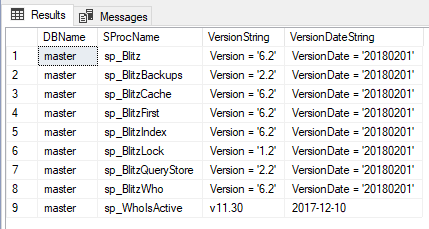I managed to get quite a usable list by sniffing out the versions within the SProcs' source code,
as stored within the sys.comments tables.

A healthy amount of assumptions was made,
so test this code on a solitary test instance first,
before going wild on your multitude of Production servers...
Edit: added Adam Machanic's sp_WhoIsActive as an example of how to add to this scanner script.
USE [master];
IF OBJECT_ID('tempdb..##DBA_SProcs') IS NOT NULL
DROP TABLE ##DBA_SProcs;
CREATE TABLE ##DBA_SProcs (
DBName NVARCHAR(100) NULL
,SProcName NVARCHAR (50) NULL
,VersionString NVARCHAR (50) NULL
,VersionDateString NVARCHAR (50) NULL
);
EXEC sys.sp_MSforeachdb
@replacechar = N'¬'
,@command1 = N'
USE[¬];
INSERT INTO ##DBA_SProcs
SELECT
DB_NAME() AS DBName
,LTRIM(RTRIM(
REPLACE(REPLACE(REPLACE(REPLACE(REPLACE(REPLACE(REPLACE(
SUBSTRING([text], CHARINDEX(''sp_Blitz'', [text], 1), 18)
,'']'','''')
,''('','''')
,CHAR(9)/*Tab*/,'' '')
,CHAR(10)/*LF*/,'' '')
,CHAR(13)/*CR*/,'' '')
,''@He'','''')
,''@Ch'','''')
)) AS SProcName
,REPLACE(REPLACE(
SUBSTRING([text], CHARINDEX(''T @Version'', [text], 1) + 3, 15)
,'', @'' , '''')
,''Version = '' , '''')
AS VersionString
,REPLACE(REPLACE(
CASE
WHEN CHARINDEX('', @VersionD'', [text], 1) > 0
THEN SUBSTRING([text], CHARINDEX('', @VersionD'', [text], 1) + 3, 24)
ELSE SUBSTRING([text], CHARINDEX(''T @VersionD'', [text], 1) + 3, 24)
END
,''VersionDate = '' , '''')
,'''''''' , '''')
AS VersionDateString
FROM sys.syscomments sc
WHERE sc.colid <= 1
AND sc.[text] LIKE ''%sp_Blitz%''
AND sc.[text] LIKE ''%T @Version%'';
INSERT INTO ##DBA_SProcs
SELECT
DB_NAME() AS DBName
,''sp_WhoIsActive'' AS SProcName
,SUBSTRING(
[text]
,CHARINDEX(''Who Is Active? v'', [text], 1) + 15
,7
) AS VersionString
,REPLACE(
SUBSTRING([text], CHARINDEX(''Who Is Active? v'', [text], 1) + 23, 10)
,''-'' , '''')
AS VersionDateString
FROM sys.syscomments sc
WHERE sc.[text] LIKE ''%sp_WhoIsActive%''
AND sc.[text] LIKE ''%Who Is Active? v%'';
';
SELECT *
FROM ##DBA_SProcs
ORDER BY DBName, SProcName;
IF OBJECT_ID('tempdb..##DBA_SProcs') IS NOT NULL
DROP TABLE ##DBA_SProcs;

